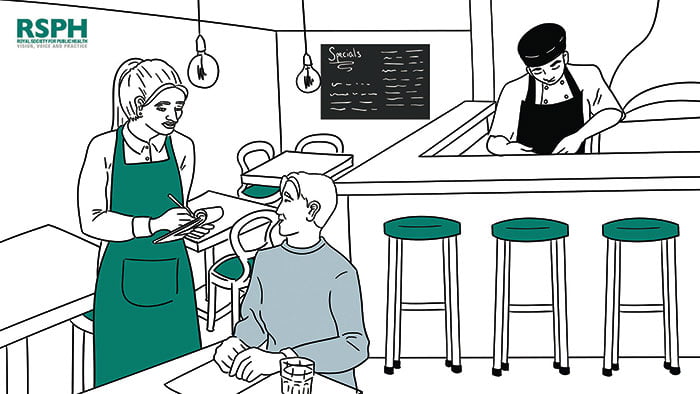Service With(out) a Smile? What Small Businesses Can Do For Staff Mental Health


The mental health and wellbeing of workers in the hospitality sector is not in a good state. At the Royal Society for Public Health (RSPH), we conducted research into the mental health of hospitality workers. The findings for our report, Service With(out) a Smile, revealed that 84% of hospitality employees reported increased stress as a direct result of their job, and one in five stated that they have a severe mental health problem they believe is directly related to their work.
While there are many good initiatives in larger organisations, such as the Pizza Hut partnership with Mental Health UK, small independent businesses often do not have access to HR teams and corporate schemes to protect mental health. In these smaller workplaces, owners, managers and staff at all levels should be empowered to safeguard the mental health and wellbeing of everyone.
Signs to look for
All staff should be aware of the symptoms to look out for that may indicate someone is experiencing problems.
Our survey found that the ten most common issues experienced by hospitality workers were (from most to least common):
• Increased stress
• Less time for other activities
• Disrupted sleep
• Anxiety
• Fatigue
• Low mood or tearfulness
• Increased irritability or anger
• Depression
• Decreased appetite
• Diminished friend or family relationships
Coping mechanisms in wider life may allude to these underlying problems. Almost three in five survey respondents reported that the effects of work on their mental health had a knock-on effect on their lifestyle, such as on diet, smoking, and alcohol consumption.
For many the negative health repercussions of hospitality work do not end as the shift does. Mental wellbeing issues that may start on the job can have consequences for mental and physical health that stretch well beyond the workplace doors. For example, social life is often compromised due to fatigue. Finances can be strained, and looking after physical health takes a backseat to work commitments.
 Guidance for dealing with these issues
Guidance for dealing with these issues
One recommendation from our report was for employers to put in place systems and processes that protect mental health and wellbeing. A staple example of this is to have regular one-to-ones between managers and employees – something all workplaces should be implementing as a matter of course.
Regular one-to-ones provide a private space to discuss mental health. Moreover, managers should be aware of their own mental health and wellbeing. Change starts from the top, and senior management should demonstrate best practice by having honest conversations and looking after their own mental health and wellbeing.
Part of the Foresight’s ‘Mental Capital and Wellbeing’ project includes a resource, Five Ways to Mental Wellbeing, which employers can utilise. Each ‘Way to Mental Wellbeing’ could form a programme of activity within a business. The first recommendation is to ‘Connect’. Suggestions from our survey on how the hospitality sector could improve included to make the working environment more fun and friendly. Both of these goals could be achieved on a team building day, for example.
Many hospitality workers reported problems with sleep and fatigue. RSPH recently published a free e-learning resource on sleep. This tool is available to all, and could provide a vital service for hospitality employers given the prevalence of sleep problems in the workforce – 71% of survey respondents reported having unsettled sleep.
Training and professional development are invaluable components of creating a workplace environment that is supportive of mental wellbeing. There’s a wide variety of programmes available, including many regulated qualifications provided through RSPH. Our qualifications cover a range of areas such as developing workplace health champions, along with hospitality specific qualifications on Allergens, Nutrition and Food Safety. The following are particularly worth highlighting for the mental health and wellbeing of the hospitality industry:
• Level 2 Award In Understanding Mental Wellbeing
• Level 2 Award in Understanding Alcohol Misuse
• Level 2 Award in Understanding Emotional Wellbeing
There is a patchwork of coverage of mental health and wellbeing support in the sector, with examples of best practice as the exception rather than the rule. It is the responsibility of all businesses to adopt supportive workplace wellbeing policies, whether they are big or small. It is by implementing these changes across the sector that the trend of hospitality workers not feeling cared for by their employers will be reversed.
By Louisa Mason, Policy and Communications Executive, Royal Society for Public Health
lmason@rsph.org.uk, www.rsph.org.uk
